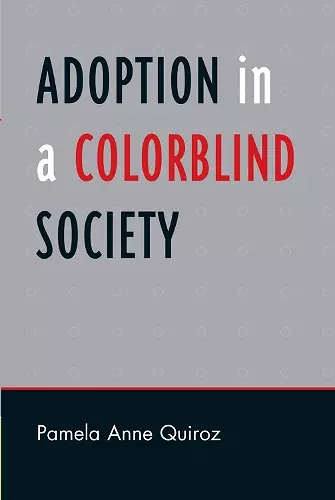Adoption in a Color-Blind Society
Format:Paperback
Publisher:Rowman & Littlefield
Published:10th Aug '07
Currently unavailable, and unfortunately no date known when it will be back

Recent adoption policy changes are based on assumptions that race is no longer relevant and that if government officials and activists would just get out of the way, adoption would provide one means of eradicating the fixation on race and racism. Adoption in a Color-Blind Society examines the public presentation of private adoption agency Web sites and 'race talk' in adoption chat rooms to lay bare the lie of color-blind discourse and reveal that rather than eroding, the meaning of race has shifted. The private adoption market provides an illustration of Eduardo Bonilla-Silva's thesis of the Latinization of the U.S. as biracial children are either 'downgraded' or 'upgraded' into a tri-racial system of categories depending at least in part upon their heritage. Drawing also on popular adoption literature and information in the public domain, the book provides a critical interpretation of the discursive practices of private adoption and argues that despite the current discourse of equity in contemporary adoption, African American children continue to be marginalized as bargain basement deals. Color-blind individualism extends beyond the U.S. to our new global reality where children are simply another commodity within the transnatinal marketplace of adoption.
Anyone who thinks that America has transcended its racist past need only look seriously at the world of adoption. In chat rooms, in marketing practices, in foster care and in private placements, race matters profoundly. Quiroz takes us into the world of adoption and makes this sad truth clear. This is important reading not only for those who care about adoption, but for all who want to understand the ongoing significance of race in America. -- Barbara Katz Rothman, Professor of sociology at the City University of New York
A decade after federal legislation made it illegal to discriminate against white parents in adoption, why is it so hard to find white parents that will adopt children of color? Adoption in a Colorblind Society asks this and other hard questions about complex issues regarding race and adoptive placement, probing the very nature of parenthood, racism, public policy, and the future of family in American society. Quiroz provides a well informed look at transnational and transracial adoption in the United States, locating questions of adoption in the midst of the contested legacies of civil rights movements, race, and struggles over who should have children. -- Laura Briggs, Associate professor of Women's Studies at University of Arizona
Quiroz's book is part of a significant but still under-recognized body of work that takes adoption as its starting place in order to explore perspectives on a multicultural society (the title of the series in which this book is published)... Her book should definitely be read by policymakers and practitioners in the adoption field, but more than this, taken up by broader audiences interested in the shifting terrain of race talk in the United States. -- Sara K. Dorow, Author of Transnational Adoption: A Cultural Economy of Race, Gender and Kinship
Recommended. * CHOICE *
I found Adoption in a Color-Blind Society an informative and useful study. I also ended up agreeing with the author that private adoptions are not color-blind. -- Rita J. Simon, American University * American Journal of Sociology *
Quiroz has illuminated the disturbing undertows that menace the current international and interracial adoption waves. She has trained her gaze on the meanings of race being made by the private adoptions of infants and young children who generate differing demands. Drawing upon online directories, websites, and chatrooms, this powerful book provides a necessary and challenging focus on the point of convergence where the adoption industry intersects with the political economy of racism. -- Bernadine Dorhn, Director of Children & Family Justice Center and Associate Clinical Professor at Northwestern University School of Law
ISBN: 9780742559424
Dimensions: 230mm x 157mm x 12mm
Weight: 236g
144 pages